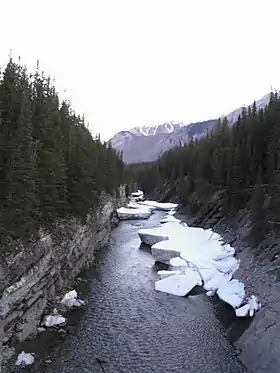Cascade River (Alberta)
The Cascade River is a medium-sized river in southwestern Alberta, Canada. It originates in the Canadian Rockies, flows through Lake Minnewanka, and in turn, joins the Bow River.
| Cascade River | |
|---|---|
 The Cascade River in Stewart Canyon | |
| Location | |
| Country | Canada |
| Province | Alberta |
| Physical characteristics | |
| Source | |
| • location | Bonnet Glacier/Badger Pass |
| • coordinates | 51°25′29″N 115°50′28″W |
| • elevation | 2,174 m (7,133 ft) |
| Mouth | |
• location | Bow River |
• coordinates | 51°09′59″N 115°28′43″W |
• elevation | 1,361 m (4,465 ft) |
| Basin features | |
| Waterbodies | Lake Minnewanka |
The Cascade River is formed from the glacial melt of Flints and Bonnet Peaks, as well as Block Mountain. Glacial lakes that drain into the Cascade include Goat Lake, Sawback Lake, Elk Lake, and Cuthead Lake. The river also takes on Stoney Creek before entering the dramatic Stewart Canyon, then draining into Lake Minnewanka.
The Cascade River is named after Cascade Mountain. The mountain was named by Sir James Hector, who took the native name which meant "mountain where the water falls" and abbreviated the term to Cascade.[1]
References
- Karamitsanis, Aphrodite (1991). Place Names of Alberta, Volume 1. Calgary: University of Calgary Press, pg. 42
This article is issued from Wikipedia. The text is licensed under Creative Commons - Attribution - Sharealike. Additional terms may apply for the media files.
